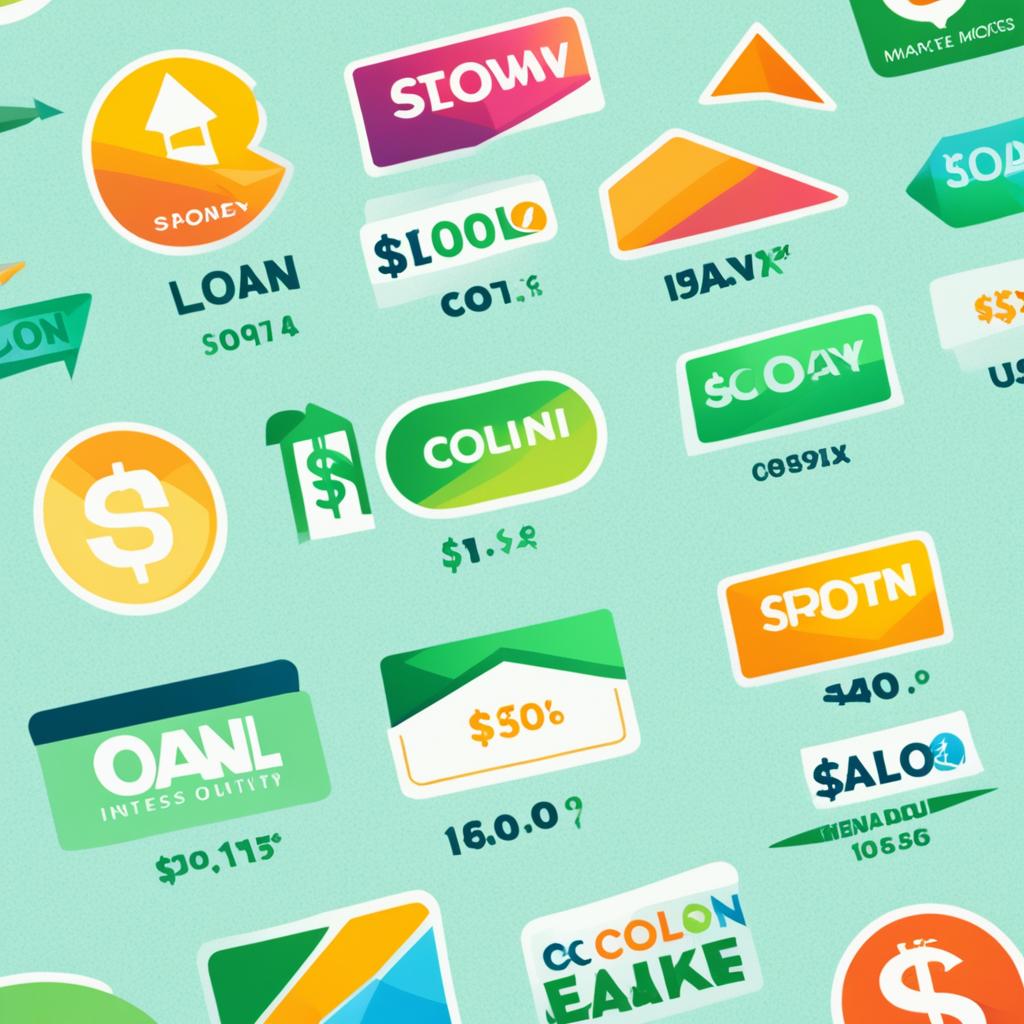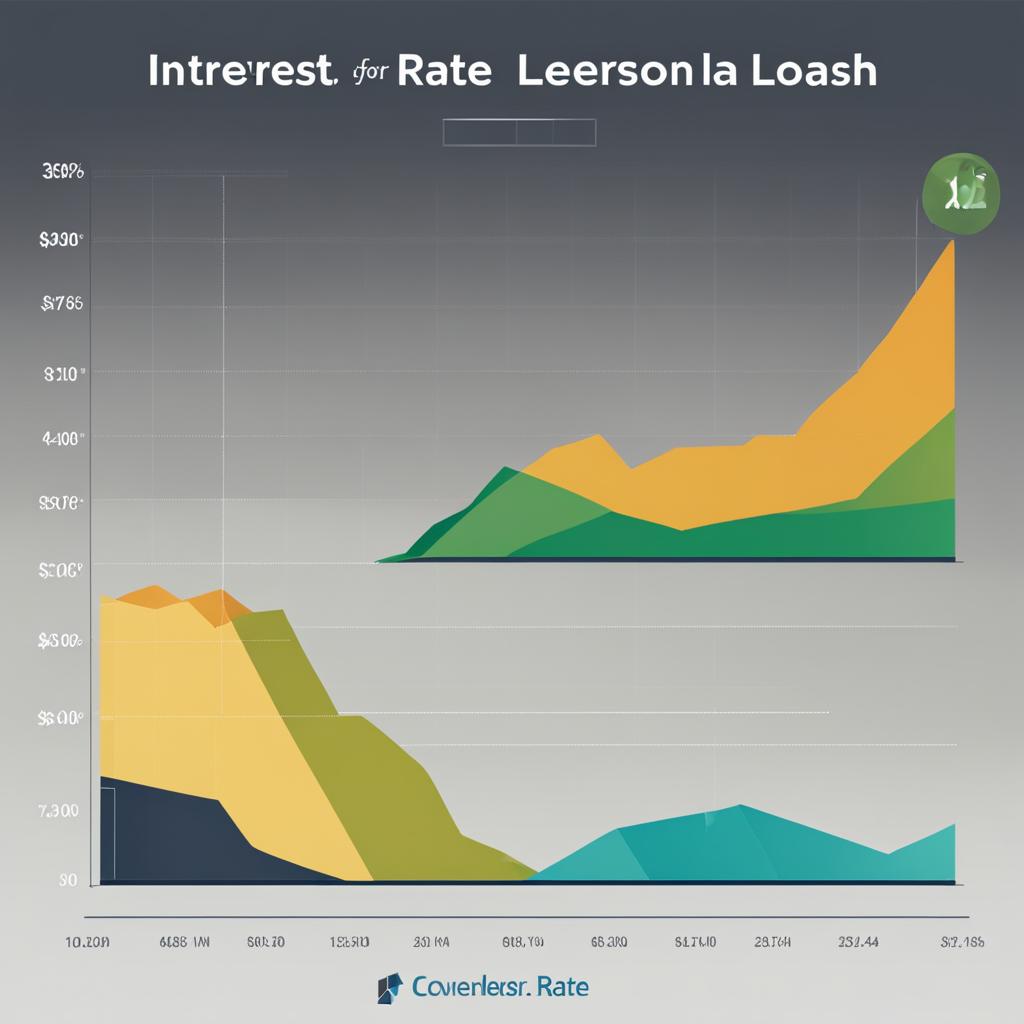Are you in need of funds for a major expense? Whether it’s for home improvement, debt consolidation, or a big purchase, low interest personal loans can provide the financial solution you’re looking for. I’m here to help you navigate the world of personal loans and find the best rates that suit your needs and budget.
At 2024, finding the right personal loan is easier than ever. With a simple formula, I compare dozens of lenders to identify the ones offering the lowest annual percentage rates (APRs). But it’s not just about low rates—eligibility requirements, lender type, state availability, and NerdWallet star ratings are also factored in to determine the overall best rates for low interest personal loans.
When applying for a personal loan, it’s important to understand how lenders set interest rates. While macroeconomic conditions may play a role, your credit and financial information are the primary factors considered. Having an excellent credit score, stable income, and minimal outstanding debt can boost your chances of qualifying for the lowest rates.
So, what exactly is considered a good interest rate on a personal loan? It depends on your individual credit and financial profile. Comparing your rate to someone else’s is not helpful, as rates can vary widely between borrowers. Instead, focus on finding the lowest rate you qualify for by checking loan offers from multiple lenders.
Key Takeaways:
- Low interest personal loans provide the financial solution for major expenses.
- I compare lenders to find the lowest rates, considering eligibility requirements and lender type.
- Excellent credit, stable income, and minimal debt increase your chances of getting the best rates.
- A good interest rate on a personal loan is unique to your credit and financial information.
- Ensure to check loan offers from multiple lenders to find the best rate for you.
How Lenders Set Personal Loan Rates
When it comes to personal loan rates, several factors come into play. While macroeconomic conditions do play a role, the specific rate you receive is primarily based on your credit and financial information. Lenders take various factors into consideration to determine your personal loan rate, including:
- Your credit score: Your credit score is a significant factor in determining your personal loan rate. Lenders typically offer lower rates to borrowers with excellent credit scores, as they demonstrate a history of responsible borrowing.
- Your income: Lenders assess your income to evaluate your ability to repay the loan. Higher incomes may qualify you for lower rates, as it indicates a lower risk of default.
- Your outstanding debt: Your existing debt obligations are taken into account when setting your personal loan rate. Lenders consider your debt-to-income ratio to determine your ability to manage additional debt.
- Your on-time payment history: Making timely payments on your debts reflects responsible financial behavior. Lenders reward borrowers with a track record of on-time payments with more favorable rates.
- Your education and occupation: Certain lenders may consider your education level and occupation as indicators of financial stability. Higher levels of education and stable employment can positively impact your loan rate.
- The requested loan amount: The amount you’re looking to borrow may also impact your interest rate. Larger loan amounts could come with higher rates, as they entail a higher level of risk for the lender.
- The purpose of the loan: The purpose for which you’re taking out the loan can also influence the rates. Some lenders may offer lower rates for specific loan purposes, such as debt consolidation or home improvements.
Borrowers with excellent credit, high incomes, and little outstanding debt are more likely to qualify for the lowest rates.
| Factors | Impact on Interest Rates |
|---|---|
| Credit Score | Higher credit scores typically result in lower interest rates. |
| Income | Higher incomes may qualify for lower rates as they demonstrate a lower risk of default. |
| Outstanding Debt | Higher debt levels can lead to higher interest rates. |
| On-time Payment History | A positive payment history reflects responsible financial behavior and can result in lower rates. |
| Education and Occupation | Higher education levels and stable occupations may lead to lower interest rates. |
| Requested Loan Amount | Larger loan amounts may come with higher interest rates. |
| Loan Purpose | Some lenders offer lower rates for specific loan purposes, such as debt consolidation or home improvements. |
Understanding the factors that lenders consider when setting personal loan rates can help you navigate the lending landscape and secure the most favorable terms possible.
What is a Good Interest Rate on a Personal Loan?
A good interest rate on a personal loan is the lowest one you qualify for, and it heavily depends on your credit and financial information. Comparing your rate to someone else’s is not helpful, as rates can vary widely between borrowers. To find the best rate and terms, it’s recommended to check loan offers from multiple lenders.
When it comes to personal loans, finding a good interest rate is crucial for ensuring affordable borrowing. Your interest rate determines how much you’ll pay back on top of the loan principal.
Personal loan interest rates are primarily based on your creditworthiness, which is determined by factors such as your credit score, income, and existing debts. Lenders use this information to assess the risk of lending money to you and determine the rate they’ll offer.
Factors that Influence Personal Loan Interest Rates
Several factors can affect the interest rate you qualify for on a personal loan:
- Credit Score: A higher credit score generally leads to lower interest rates. Lenders view borrowers with good credit as less risky, and therefore, more likely to make timely repayments.
- Income and Employment History: Lenders assess your ability to repay the loan by considering your income and employment stability. A stable income and a steady employment history can improve your chances of getting a lower interest rate.
- Debt-to-Income Ratio: Lenders evaluate your debt-to-income ratio, which compares your monthly debt payments to your monthly income. A lower debt-to-income ratio indicates that you have more disposable income to cover loan repayments, potentially resulting in a lower interest rate.
- Loan Term: The length of the loan term also affects the interest rate. Generally, shorter loan terms come with lower interest rates compared to longer terms.
It’s important to note that lenders have their own lending criteria and may weigh these factors differently. Therefore, it’s beneficial to compare loan offers from multiple lenders to find the best interest rate for your specific credit and financial profile.
How to Get the Best Personal Loan Rate
To secure the best personal loan rate, there are several steps you can take. By following these tips, you’ll increase your chances of getting a loan with favorable terms and lower interest rates.
1. Review and Improve Your Credit Report
Before applying for a personal loan, it’s essential to review your credit report. Check for any errors or negative accounts that may be affecting your credit score. Addressing these issues can potentially improve your credit standing and increase your chances of getting a better rate.
2. Adjust Your Loan Amount
When determining the loan amount, consider choosing an amount that will help you avoid higher interest rates. Lenders often offer lower rates for loans within certain ranges. By adjusting your loan amount accordingly, you can potentially secure a better rate.
3. Look for Rate Discounts
Some lenders offer rate discounts for certain actions. For example, setting up automatic payments can qualify you for a lower interest rate. Existing customers may also be eligible for rate reductions. When researching lenders, look for those that provide these types of benefits.
4. Find a No-Fee Lender
Loan fees can add to the overall cost of borrowing. To minimize expenses, consider finding a lender that doesn’t charge any additional fees, such as origination fees or prepayment penalties. Avoiding these fees will help you keep your loan cost down.
“By reviewing my credit report and adjusting my loan amount, I was able to secure a personal loan with a competitive interest rate. Finding a no-fee lender further reduced my borrowing costs. Take these steps to get the best rate on your personal loan.” – [Your Name]
5. Consider Adding a Co-Signer or Collateral
If you have a co-signer with a strong credit history or collateral, such as a home or a vehicle, you may be able to secure a lower interest rate. Adding additional security to your loan application shows lenders that you’re less risky, potentially leading to a better rate.
6. Take Advantage of Pre-Qualification
Many lenders offer pre-qualification, which allows you to see potential loan amounts, rates, and terms without impacting your credit score. By taking advantage of this feature, you can compare offers from multiple lenders and choose the one that offers the best rate for your personal loan.
By following these steps, you can increase your chances of obtaining the best personal loan rate for your financial needs.
How Personal Loan Rates Affect Monthly Payments
When applying for a personal loan, it’s important to consider how the interest rate will impact your monthly payments. The interest rate directly affects the total cost of the loan and ultimately determines the amount you’ll need to repay each month.
Here’s how it works: the lower the interest rate, the lower your monthly payment will be. A lower interest rate means you’ll pay less in interest charges over the life of the loan. This can translate into significant savings and make your monthly payments more manageable.
To better understand how different interest rates, loan amounts, and loan terms can affect your payments, you can use a personal loan calculator. This helpful tool allows you to input the loan amount, interest rate, and loan term to calculate your monthly payments.
By using a personal loan calculator, you can see the impact of various interest rates on your monthly payments. It provides a clear picture of how different lending options can affect your budget and helps you make an informed decision when choosing the right personal loan for your needs.
Example:
Let’s consider an example to demonstrate how personal loan rates affect monthly payments. Suppose you’re borrowing $10,000 with a 5-year term. Here’s how different interest rates can change your payments:
| Interest Rate (%) | Monthly Payment |
|---|---|
| 5% | $188.71 |
| 8% | $202.76 |
| 10% | $212.47 |
| 15% | $233.79 |
In this example, you can see the significant difference in monthly payments based on the interest rate. A lower interest rate of 5% results in a monthly payment of $188.71, while a higher interest rate of 15% increases the monthly payment to $233.79.
Using a personal loan calculator can help you tailor your loan based on your budget and financial goals. It allows you to explore different scenarios and find the best interest rate, loan term, and loan amount that align with your needs.
Personal Loan Rates by Credit Score
When it comes to online personal loans, the average estimated APRs can vary based on credit score ranges. Your credit score plays a significant role in determining the interest rate you’ll be offered on a personal loan. Borrowers with excellent credit scores, ranging from 720 to 850, can expect APRs around 12.42%. On the other hand, those with credit scores in the fair range, between 300 and 629, may face higher APRs, averaging around 21.10%.
Keep in mind that these rates are estimates and can vary depending on the specific lenders you apply to. It’s essential to compare loan offers from multiple lenders to ensure you’re getting the best possible rate for your credit score range.
It’s worth noting that loans with maximum APRs above 36% are generally considered unaffordable and should be avoided. These high rates can make it challenging to repay the loan and may lead to financial difficulties.
“Your credit score plays a significant role in determining the interest rate you’ll be offered on a personal loan.”
Best Personal Loan Lenders in 2024
In 2024, I have identified several standout lenders in the personal loan industry. These lenders offer competitive rates and a variety of loan amounts to meet the diverse needs of borrowers. Whether you’re looking for generous repayment terms, low APRs, or fast funding, these top lenders have you covered.
LightStream
If you’re seeking flexible repayment terms, LightStream is an excellent option. They offer a wide range of loan amounts and terms, allowing you to find a personalized solution that fits your financial goals.
Citi
Citi is known for offering competitive rates, especially for existing customers. If you already have a relationship with Citi, they may provide you with favorable terms and rates on your personal loan.
Upgrade
When you need fast funding, Upgrade is a top choice. Their streamlined application process and quick approval time ensure you can access funds when you need them most.
Best Egg
If you’re looking for low APRs, Best Egg is worth considering. They offer attractive interest rates, helping you save on interest payments over the life of your loan.
Upstart, SoFi, PenFed Credit Union, and LendingPoint
In addition to the above lenders, Upstart, SoFi, PenFed Credit Union, and LendingPoint are also noteworthy options for personal loans. These lenders provide a range of loan amounts and terms to suit various borrower needs.

When comparing personal loan lenders, be sure to consider factors such as interest rates, loan amounts, repayment terms, and customer reviews. Each borrower has unique needs and preferences, so take the time to find the lender that offers the best fit for you.
Personal Loan Options for Different Credit Scores
When it comes to personal loans, the options available to you can vary depending on your credit score. Lenders consider credit scores as a key factor in determining loan eligibility and interest rates. Whether you have excellent credit, fair credit, or bad credit, there are lenders who cater to borrowers with different credit scores.
If you have excellent credit, with a credit score ranging from 720 to 850, you have access to some of the best loan options in terms of favorable rates and terms. Lenders such as LightStream, SoFi, and Prosper offer competitive rates and flexible terms for borrowers with excellent credit.
If your credit score falls into the fair credit range, between 630 and 689, you still have options available. Lenders like LendingClub and Upstart specialize in serving borrowers with fair credit. While interest rates may be slightly higher compared to those with excellent credit, these lenders provide opportunities for fair credit borrowers to secure personal loans.
For borrowers with bad credit, with scores ranging from 300 to 629, there are lenders who specialize in serving this market. Avant and LendingPoint are reputable lenders that consider factors beyond credit scores when evaluating loan applications. They offer personal loan options for borrowers with bad credit, helping them access the funds they need.
If you fall into the fair to poor credit range and are willing to provide collateral, OneMain Financial offers secured loans. Secured loans require some form of collateral, such as a car or savings account, which can help you secure a loan even with a lower credit score.
There are also lenders like TD Bank and PenFed Credit Union that cater to borrowers with small loan amounts and good credit. These lenders offer personal loan options that are suitable for specific borrowing needs.
Personal Loan Options for Different Credit Scores
| Credit Score Range | Recommended Lenders |
|---|---|
| Excellent Credit (720-850) | LightStream, SoFi, Prosper |
| Fair Credit (630-689) | LendingClub, Upstart |
| Bad Credit (300-629) | Avant, LendingPoint |
| Fair to Poor Credit (Collateral) | OneMain Financial |
| Good Credit (Small Loan Amounts) | TD Bank, PenFed Credit Union |
How to Choose the Best Personal Loan
When it comes to choosing the best personal loan, it’s important to take various factors into consideration. By comparing loan features, customer reviews, and other important aspects, you can make an informed decision that suits your needs and preferences. Here’s a guide on how to choose the best personal loan:
- Compare Interest Rates: One of the key factors to consider is the loan’s Annual Percentage Rate (APR). This rate determines the total cost of borrowing and varies between lenders. By comparing APRs, you can find a loan with a competitive interest rate.
- Evaluate Loan Features: Look beyond the interest rate and consider the loan features offered by different lenders. Some lenders may provide flexible repayment terms, allowing you to customize your loan duration or adjust your monthly payments.
- Read Customer Reviews: Before selecting a lender, take the time to read customer reviews. Genuine feedback from other borrowers can give you valuable insights into the lender’s reputation, customer service, and overall experience.
- Consider Fees and Penalties: Review the loan agreement carefully to identify any fees or penalties associated with the loan. Some common fees include origination fees, late payment fees, and prepayment penalties. Understanding these costs upfront can help you avoid any surprises down the line.
- Analyze Your Financial Situation: Consider your own financial situation, including your income, expenses, and ability to repay the loan. Assessing your finances will help you determine the loan amount you need and the repayment terms you can comfortably manage.
Choosing the best personal loan requires thorough research and careful consideration of all relevant factors. By comparing loan options, evaluating lender features, and understanding your personal financial situation, you can confidently select a loan that meets your needs.
| Lender | Interest Rate (APR) | Loan Amount | Repayment Terms | Customer Reviews |
|---|---|---|---|---|
| ABC Bank | 4.25% – 8.99% | $1,000 – $50,000 | 1 – 5 years | ★★★★☆ |
| XYZ Credit Union | 5.99% – 12.99% | $2,000 – $35,000 | 2 – 7 years | ★★★★★ |
| LMN Online Lending | 6.75% – 15.99% | $1,000 – $40,000 | 1 – 6 years | ★★★☆☆ |
Table: Comparison of Personal Loan Options
By analyzing these loan features, interest rates, and customer reviews, you can make a well-informed decision and choose the best personal loan that suits your needs and financial goals.
How to Apply for a Personal Loan
Applying for a personal loan is a straightforward process that can be completed online. To ensure a smooth application experience, it’s important to gather the necessary personal and financial information beforehand. This includes your name, address, social security number, income, and employment details.
When applying for a personal loan, lenders may require supporting documents to verify your financial information. These documents may include recent bank statements and pay stubs. Providing accurate and up-to-date documents will help streamline the application process.
Online applications have made the personal loan application process quick and convenient. You can access the lender’s website, fill out the application form, and submit it electronically. Some lenders may also offer pre-qualification, allowing you to check potential loan amounts, rates, and terms without impacting your credit score.
After submitting your application, the lender will review your information and make a decision on loan approval. This process typically takes a few business days. If approved, you will receive the loan offer, which will include details such as the loan amount, interest rate, and repayment term.
Here is a step-by-step guide on how to apply for a personal loan:
- Gather your personal and financial information, including your name, address, social security number, income, and employment details.
- Prepare supporting documents such as bank statements and pay stubs to verify your financial information.
- Visit the lender’s website and navigate to the personal loan application page.
- Fill out the application form, providing accurate and truthful information.
- Submit the application electronically.
- Wait for the lender to review your information and make a decision on loan approval.
- If approved, carefully review the loan offer, including the loan amount, interest rate, and repayment term.
- Accept the loan offer if it meets your financial needs and sign the necessary documents.
- Receive the loan funds, usually through direct deposit into your bank account.
Applying for a personal loan is a straightforward process that can be completed online. By providing accurate information and preparing necessary documents, you can increase your chances of loan approval and expedite the loan application process.
Managing Your Personal Loan
Once you have been approved for a personal loan, it’s important to manage it responsibly. By implementing effective strategies, you can stay on top of your personal loan repayment and work towards becoming debt-free. Here are a few key steps to help you manage your personal loan successfully:
- Set up automatic payments: One of the easiest ways to ensure timely repayments is by setting up automatic payments. By authorizing your lender to deduct the monthly installment from your bank account, you can avoid missed or late payments. This not only helps maintain a good repayment record but also saves you from potential late fees and negative impact on your credit score.
- Create a budget: Developing a budget that includes your loan repayment is essential for managing your personal loan effectively. By allocating funds specifically towards your loan payments, you can stay organized and never miss a payment. Tracking your income and expenses will also give you a clear picture of your overall financial health and help you identify areas where you can save money and allocate more towards debt repayment.
- Consider debt management strategies: If you want to pay off your personal loan faster, consider implementing debt management strategies. Making extra payments whenever possible can significantly reduce the principal amount, thereby reducing the overall interest you’ll pay over time. Additionally, if you receive any windfalls or lump sums, consider using them towards paying down your loan. These strategies can help you become debt-free sooner and save money in the long run.
- Regularly check your loan balance: It’s important to stay informed about your loan balance and track your progress towards paying off the loan. By regularly checking your loan balance, you can have a clear understanding of how much is left to repay and make any necessary adjustments to your financial plan. This also allows you to celebrate milestones along the way as you see your loan balance decrease over time.
“Effective loan management involves setting up automatic payments to ensure timely repayments, creating a budget to allocate funds towards loan payments, considering debt management strategies to pay off the loan faster, and regularly checking your loan balance to track your progress.”
By following these steps and staying disciplined, you can successfully manage your personal loan and achieve financial freedom. Remember, responsible loan management not only helps you meet your financial obligations but also improves your creditworthiness, setting you up for future loan opportunities with more favorable terms.
Conclusion
Low interest personal loans provide a viable financial option for borrowers in need of funds. By comparing rates, understanding eligibility requirements, and considering factors such as credit score and loan purpose, borrowers can find the best rates and terms. It’s important to choose a reputable lender and manage the loan responsibly to achieve financial goals. With the right personal loan, borrowers can access affordable funds and improve their overall financial well-being.
Overall, low interest personal loans offer competitive rates and flexible financial options for individuals seeking to finance their goals and aspirations. Whether it’s consolidating high-interest debt, funding home improvements, or financing major expenses, personal loans provide a convenient and affordable solution.
Loan Approval Requirements
When applying for a personal loan, it’s important to understand the eligibility criteria that lenders consider during the approval process. Meeting these requirements increases your chances of loan approval and may result in better interest rates.
Eligibility Criteria
To be eligible for a personal loan, lenders typically consider the following criteria:
- Credit Score: A good credit score is often a key requirement for loan approval. Lenders want to ensure that borrowers have a history of responsible credit management.
- Stable Income: Lenders evaluate your income to assess your ability to repay the loan. Having a stable and consistent source of income improves your loan approval chances.
- Low Debt-to-Income Ratio: Lenders analyze your debt-to-income ratio to determine your capacity to take on additional debt. Maintaining a low ratio indicates that you have sufficient income to support loan payments.
- Employment History: A stable employment history demonstrates financial stability, which is favorable for loan approval.
- Loan Purpose: Lenders may consider the purpose of the loan, such as debt consolidation or home improvement, to assess the risk associated with the loan.
- Income Verification: Lenders typically require income verification through pay stubs or tax returns to validate the information provided in the loan application.
Increasing Your Approval Chances
If you want to improve your chances of loan approval, it’s essential to work on strengthening the eligibility criteria considered by lenders. This can include:
- Improving Your Credit Score: Paying bills on time, reducing outstanding debt, and monitoring your credit report for errors can help boost your credit score over time.
- Building Stable Income: Demonstrating a consistent income stream through stable employment or other reliable sources can increase your approval chances.
- Reducing Debt: Paying down debts can lower your debt-to-income ratio and make you more attractive to lenders.
- Providing Complete Documentation: Ensure you have all the necessary documents, such as pay stubs or tax returns, ready to verify your income during the loan application process.
Meeting the eligibility criteria and taking steps to strengthen your financial profile not only increases your chances of loan approval but may also help you secure better interest rates on your personal loan.
| Eligibility Criteria | Importance |
|---|---|
| Credit Score | High |
| Stable Income | High |
| Low Debt-to-Income Ratio | Moderate |
| Employment History | Moderate |
| Loan Purpose | Moderate |
| Income Verification | High |
Loan Repayment Options
When it comes to repaying your personal loan, you have several options available to you. Lenders typically offer repayment plans that include monthly installments over a fixed term. It’s important to choose a repayment plan that aligns with your financial situation and ensures timely loan repayment. Let’s explore some common options:
Fixed and Variable Interest Rates
Depending on the lender, you may have the choice between fixed and variable interest rates for your personal loan. A fixed interest rate remains the same throughout the loan term, providing stability and predictability. On the other hand, a variable interest rate may fluctuate over time, potentially resulting in lower or higher payments depending on market conditions. Consider your risk tolerance and budgetary preferences when selecting an interest rate type for your loan.
Term Lengths
Lenders also offer different term lengths for personal loans, typically ranging from one to five years or longer. A shorter term length generally means higher monthly payments but lower overall interest costs, while a longer term length can result in lower monthly payments but higher total interest paid over the life of the loan. Consider your financial goals and ability to comfortably make payments when deciding on a term length for your loan.
Automatic Debit
Many lenders offer the convenience of automatic debit for loan repayments. With automatic debit, your loan payment is automatically deducted from your bank account on a specified date each month. This can help ensure timely payments and give you peace of mind knowing that you won’t miss a payment. Be sure to check with your lender if they offer automatic debit as an option for your personal loan.

| Repayment Option | Features |
|---|---|
| Fixed Interest Rate | Stable and predictable payments throughout the loan term. |
| Variable Interest Rate | Interest rate may fluctuate over time, resulting in potentially lower or higher payments. |
| Shorter Term Length | Higher monthly payments but lower overall interest costs. |
| Longer Term Length | Lower monthly payments but higher total interest paid over the life of the loan. |
| Automatic Debit | Loan payment is automatically deducted from your bank account on a specified date each month. |
Ultimately, the choice of repayment options depends on your individual preferences and financial circumstances. Consider your budget, interest rate preferences, and desired repayment timeline when selecting the best loan repayment plan for you.
Personal Loan Benefits
Personal loans offer several advantages for borrowers. Whether you need quick funding for unexpected expenses, want to consolidate your debts, or are planning a home improvement project, personal loans can provide the financial flexibility you need. Here are some key benefits of personal loans:
1. Quick Funding
When you’re facing an urgent financial need, personal loans can be a lifeline. Unlike other types of loans that may have a lengthy approval process, personal loans are often approved quickly, allowing you to access funds within a short timeframe. Whether it’s a medical emergency, car repairs, or a home repair project, personal loans can provide the financial relief you need in a timely manner.
2. Debt Consolidation
If you’re juggling multiple debts with high interest rates, debt consolidation can help simplify your finances and potentially save you money. By taking out a personal loan, you can pay off all your existing debts and consolidate them into a single, manageable monthly payment. This not only makes it easier to keep track of your payments but also allows you to potentially secure a lower interest rate, reducing your overall interest payments and helping you pay off your debt faster.
3. Flexibility in Using Funds
Personal loans provide borrowers with the flexibility to use the funds for various purposes. Whether you’re planning a much-needed vacation, financing a wedding, or making a large purchase, personal loans can be used for a wide range of expenses. This flexibility allows you to achieve your financial goals without any restrictions on how you use the borrowed funds.
4. Competitive Interest Rates
Personal loans often come with competitive interest rates, especially for borrowers with good credit. Compared to credit cards or other high-interest loans, personal loans can offer lower interest rates, potentially saving you a significant amount of money over the life of the loan. By comparing lenders and finding the best interest rate available, you can maximize your savings and minimize the cost of borrowing.
“Personal loans provide quick funding and advantages like debt consolidation, making them a versatile financial solution for various needs.”– [Your Name]
5. Predictable Repayment Terms
Personal loans typically come with fixed interest rates and fixed monthly payments over a specific term. This predictability makes it easier to budget and plan your finances since you know exactly how much you’ll need to pay each month. Unlike credit cards with fluctuating interest rates, personal loans offer stable repayment terms that help you stay on track and avoid surprises.
When considering a personal loan, it’s important to carefully weigh the benefits against any potential drawbacks. Depending on your individual circumstances, personal loans may not be the best option for everyone. It’s crucial to assess your financial situation, take into account the interest rates offered, and carefully review the terms and conditions before making a decision.
| Advantages | Considerations |
|---|---|
| Quick funding for urgent needs | Interest rates may vary depending on credit |
| Potential savings through debt consolidation | Some lenders may have origination fees |
| Flexibility to use funds for various purposes | Borrowing may increase overall debt |
| Competitive interest rates | Missed payments may affect credit score |
| Predictable repayment terms | Penalties for early repayment |
Overall, personal loans offer advantages such as quick funding, debt consolidation, and flexibility in using funds. By evaluating your financial needs and comparing loan offers from reputable lenders, you can make an informed decision that aligns with your goals and helps you achieve financial stability.
How We Chose the Best Personal Loan Lenders
In selecting the best personal loan lenders, we conducted a thorough evaluation based on several key factors. Our criteria included the lenders’ APR ranges, loan amounts, and loan terms. We also took into consideration customer reviews and the industry reputation of each lender.
Customer reviews played a vital role in our selection process, as they provided valuable insights into the overall experience borrowers had with each lender. We carefully considered feedback on customer service, application process, and loan terms to ensure that the lenders we recommended deliver a positive experience for borrowers.
Furthermore, we paid close attention to the industry reputation of each lender. We examined their track record, years of operation, and any notable accolades or recognition they have received. This allowed us to select lenders with a proven track record of providing competitive rates, flexible terms, and exceptional customer service.
It’s important to note that we also considered eligibility requirements, loan features, and the overall customer experience when making our final selection. We wanted to ensure that the lenders included in our list not only offered favorable rates and terms but also provided a seamless and transparent borrowing process for our readers.
FAQ
How do lenders set personal loan rates?
What is considered a good interest rate on a personal loan?
How can I get the best personal loan rate?
How do personal loan rates affect monthly payments?
What are the average estimated APRs for online personal loans?
Who are the best personal loan lenders in 2024?
What are the personal loan options for different credit scores?
How do I choose the best personal loan?
What is the application process for a personal loan?
How do I manage my personal loan?
What are the benefits of personal loans?
How did you choose the best personal loan lenders?
What are the loan approval requirements for personal loans?
What are the repayment options for personal loans?
How do personal loan rates affect monthly payments?
What are the benefits of personal loans?
How did you choose the best personal loan lenders?
Source Links
- https://www.nerdwallet.com/best/loans/personal-loans/personal-loan-interest-rates
- https://www.lendingtree.com/personal/
- https://www.bankrate.com/loans/personal-loans/rates/
Money posts:
 Personal Loan Offers: Finding The Best Deal (2024)
Personal Loan Offers: Finding The Best Deal (2024)
 Emergency Same Day Loans: A Lifesaver or Trap? (2024)
Emergency Same Day Loans: A Lifesaver or Trap? (2024)
 Payday Loans: Quick Cash or Quicksand? (2024)
Payday Loans: Quick Cash or Quicksand? (2024)
 Car Title Loans Online: Fast Cash or Fast Trouble? (2024)
Car Title Loans Online: Fast Cash or Fast Trouble? (2024)
 Best Debt Consolidation Loans: Clear Debt Faster (2024)
Best Debt Consolidation Loans: Clear Debt Faster (2024)
 One Main Financial Horror Stories: Beware or Believable? (2024)
One Main Financial Horror Stories: Beware or Believable? (2024)
 Secured Loan with a Financed Car: How-To Guide (2024)
Secured Loan with a Financed Car: How-To Guide (2024)
 Home Improvement Loans: Renovate Your Dream Home (2024)
Home Improvement Loans: Renovate Your Dream Home (2024)

